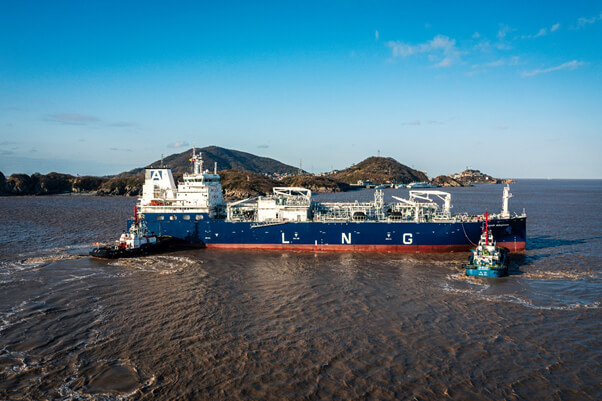ExxonMobil Charters Two Vessels to Launch LNG Bunker Business

ExxonMobil announced it is entering the LNG marine bunkering market as part of its broader strategy to pursue up to $30 billion in lower-emission investments by 2031. It said that supportive policies and a rising demand for LNG in marine transportation are creating opportunities in the market and driving its decision to enter the business by initially chartering two vessels.
“Both LNG and bio-LNG can help reduce lifecycle GHG emissions compared with conventional marine fuels,” said Amy Wood, ExxonMobil Global Lower Emission Fuel Manager. “Our combination of LNG expertise and a proven record as a trusted marine industry supplier is helping us deliver these fuel options.”
The company cites its more than four decades of experience in LNG across the entire value chain. It confirmed the charter of two vessels as the backbone of its initial LNG marine supply capability. However, to ensure continuity of service and meet customer needs, the company said ahead of the delivery of the new vessels, it is also actively developing “complementary supply solutions.” The strategy will enable an early market entry for ExxonMobil and support customers who are ready to adopt LNG as a marine fuel.
The first vessel, chartered from Avenir LNG, is scheduled for delivery in the first quarter of 2027, followed by a second vessel from Evalend Shipping in the fourth quarter of 2027. Further, ExxonMobil reports that it plans to expand its LNG bunkering fleet over time to support growing customer demand.
Avenir currently owns and operates a fleet of five LNG bunker and supply vessels, and in April 2024 announced an order for two 20,000 cbm vessels. Being built in China at Nantong CIMC Sinopacific Offshore & Engineering, the vessels are due for delivery in the fourth quarter of 2026 and the first quarter of 2027. Avenir pioneered with 20,000 cbm vessels several years ago before selling its first pair to Chinese operators. The company highlights that it is de-risking its newbuild program through long-term charters that also provide sustainable cash flow.
The first of Avenir’s new vessels will be operated by Vitol International Shipping under a seven-year charter that can be extended up to 10 years in total. SeaRiver Maritime, the marine transportation affiliate of ExxonMobil, has agreed to take the second vessel under a multi-year charter when it is delivered in 2027.
Avenir reported when the vessels were ordered that they would feature new Type C tank designs and lower boil-off rates. In addition to the latest engine technologies, the hull form has been optimized and incorporates subcoolers that will offer carbon emission reductions and minimize cargo losses compared to other vessels of the same size. The vessel design enables compatibility and versatility for loading and discharging LNG and BioLNG to a wide range of receiving vessels and terminals.
The decision of an energy major to jump into the bunkering segment is seen as another confirmation of the longer-term role LNG and later bio-LNG are likely to take in the maritime sector’s fuel strategy. The ship-to-ship LNG bunkering business emerged 15 years ago, and today DNV reports there are 62 LNG bunker vessels in service with 185 ports currently providing LNG fueling capabilities.
The maritime industry continues to embrace LNG. DNV estimates that the number of vessels operating on LNG, currently at 788, will nearly double over the next eight years. The orderbook currently stands at 688 LNG dual-fuel vessels, with containerships leading, followed by car carriers, but LNG has been adopted by nearly every segment of commercial shipping.
